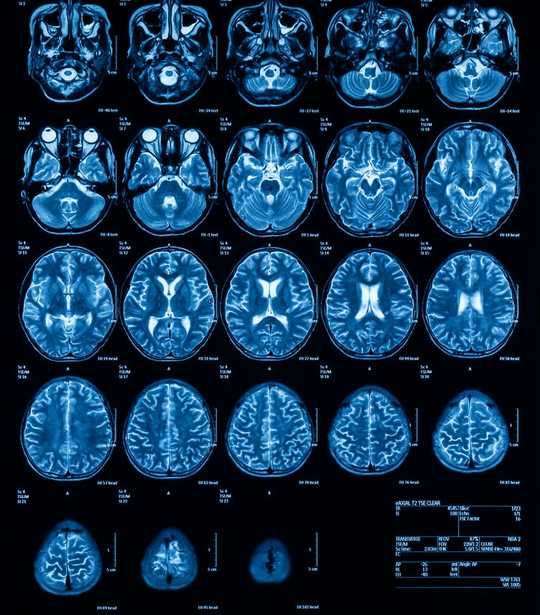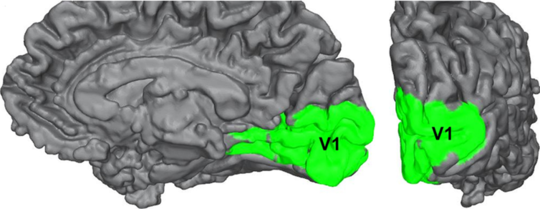 Brain scan of a boy with fever and alteration of consciousness. Suttha Burawonk
Brain scan of a boy with fever and alteration of consciousness. Suttha Burawonk
Imagine being completely blind but still being able to see. Does that sound impossible? Well, it happens. A few years ago, a man (let’s call him Barry) suffered two strokes in quick succession. As a result, Barry was completely blind, and he walked with a stick.
One day, some psychologists placed Barry in a corridor full of obstacles like boxes and chairs. They took away his walking stick and told him to walk down the corridor. The result of this simple experiment would prove dramatic for our understanding of consciousness. Barry was able to navigate around the obstacles without tripping over a single one.
Barry has blindsight, an extremely rare condition that is as paradoxical as it sounds. People with blindsight consistently deny awareness of items in front of them, but they are capable of amazing feats, which demonstrate that, in some sense, they must be able to see them.
In another case, a man with blindsight (let’s call him Rick) was put in front of a screen and told to guess (from several options) what object was on the screen. Rick insisted that he didn’t know what was there and that he was just guessing, yet he was guessing with over 90% accuracy.
Into the brain
Blindsight results from damage to an area of the brain called the primary visual cortex. This is one of the areas, as you might have guessed, responsible for vision. Damage to primary visual cortex can result in blindness – sometimes total, sometimes partial.
So how does blindsight work? The eyes receive light and convert it into information that is then passed into the brain. This information then travels through a series of pathways through the brain to eventually end up at the primary visual cortex. For people with blindsight, this area is damaged and cannot properly process the information, so the information never makes it to conscious awareness. But the information is still processed by other areas of the visual system that are intact, enabling people with blindsight to carry out the kind of tasks that we see in the case of Barry and Rick.
 Some blind people appear to be able to ‘see’. Akemaster/Shutterstock
Some blind people appear to be able to ‘see’. Akemaster/Shutterstock
Blindsight serves as a particularly striking example of a general phenomenon, which is just how much goes on in the brain below the surface of consciousness. This applies just as much to people without blindsight as people with it. Studies have shown that naked pictures of attractive people can draw our attention, even when we are completely unaware of them. Other studies have demonstrated that we can correctly judge the colour of an object without any conscious awareness of it.
Blindsight debunked?
Blindsight has generated a lot of controversy. Some philosophers and psychologists have argued that people with blindsight might be conscious of what is in front of them after all, albeit in a vague and hard-to-describe way.
This suggestion presents a difficulty, because ascertaining whether someone is conscious of a particular thing is a complicated and highly delicate task. There is no “test” for consciousness. You can’t put a probe or a monitor next to someone’s head to test whether they are conscious of something – it’s a totally private experience.
We can, of course, ask them. But interpreting what people say about their own experiences can be a thorny task. Their reports sometimes seem to indicate that they have no consciousness at all of the objects in front of them (Rick once insisted that he did not believe that there really were any objects there). Other individuals with blindsight report feeling “visual pin-pricks” or “dark shadows” indicating the tantalising possibility that they did have some conscious awareness left over.
The boundaries of consciousness
So, what does blindsight tell us about consciousness? Exactly how you answer this question will heavily depend on which interpretation you accept. Do you think that those who have blindsight are in some sense conscious of what is out there or not?
 The visual cortex. Geyer S, Weiss M, Reimann K, Lohmann G and Turner R/wikipedia, CC BY-SA
The visual cortex. Geyer S, Weiss M, Reimann K, Lohmann G and Turner R/wikipedia, CC BY-SA
If they’re not, then blindsight provides an exciting tool that we can use to work out exactly what consciousness is for. By looking at what the brain can do without consciousness, we can try to work out which tasks ultimately require consciousness. From that, we may be able to work out what the evolutionary function of consciousness is, which is something that we are still relatively in the dark about.
On the other hand, if we could prove that people with blindsight are conscious of what is in front of them, this raises no less interesting and exciting questions about the limits of consciousness. What is their consciousness actually like? How does it differ from more familiar kinds of consciousness? And precisely where in the brain does consciousness begin and end? If they are conscious, despite damage to their visual cortex, what does that tell us about the role of this brain area in generating consciousness?
In my research, I am interested in the way that blindsight reveals the fuzzy boundaries at the edges of vision and consciousness. In cases like blindsight, it becomes increasingly unclear whether our normal concepts such as “perception”, “consciousness” and “seeing” are up to the task of adequately describing and explaining what is really going on. My goal is to develop more nuanced views of perception and consciousness that can help us understand their distinctly fuzzy edges.
To ultimately understand these cases, we will need to employ careful philosophical reflection on the concepts we use and the assumptions we make, just as much as we will need a thorough scientific investigation of the mechanics of the mind.![]()
About The Author
Henry Taylor, Birmingham Fellow in Philosophy, University of Birmingham
This article is republished from The Conversation under a Creative Commons license. Read the original article.
Related Books:
The Body Keeps the Score: Brain Mind and Body in the Healing of Trauma
by Bessel van der Kolk
This book explores the connections between trauma and physical and mental health, offering insights and strategies for healing and recovery.
Click for more info or to order
Breath: The New Science of a Lost Art
by James Nestor
This book explores the science and practice of breathing, offering insights and techniques for improving physical and mental health.
Click for more info or to order
The Plant Paradox: The Hidden Dangers in "Healthy" Foods That Cause Disease and Weight Gain
by Steven R. Gundry
This book explores the links between diet, health, and disease, offering insights and strategies for improving overall health and wellness.
Click for more info or to order
The Immunity Code: The New Paradigm for Real Health and Radical Anti-Aging
by Joel Greene
This book offers a new perspective on health and immunity, drawing on principles of epigenetics and offering insights and strategies for optimizing health and aging.
Click for more info or to order
The Complete Guide to Fasting: Heal Your Body Through Intermittent, Alternate-Day, and Extended Fasting
by Dr. Jason Fung and Jimmy Moore
This book explores the science and practice of fasting offering insights and strategies for improving overall health and wellness.
Click for more info or to order

























